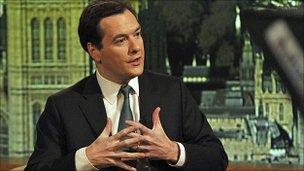Spending Review: We'll see cuts through, says Osborne
- Published

George Osborne said UK business backed his cuts programme
Chancellor George Osborne has promised to see through the government's spending cuts programme, saying it will "get us out of this stronger".
He said agreement between cabinet ministers was now "complete" ahead of Wednesday's Spending Review.
He declined to discuss press reports that child benefits for 16 to 19-year-olds could be abolished.
Meanwhile, 35 business leaders have signed a letter in the Daily Telegraph backing the deficit reduction plans.
The bosses of companies including BT, Kingfisher, Asda, Carphone Warehouse, Microsoft UK, Whitbread, Alliance Boots, Diageo, Next, and Hammerson said it would be a "mistake" to water down or delay the proposals.
The letter states: "The private sector should be more than capable of generating additional jobs to replace those lost in the public sector."
BBC business editor Robert Peston said in his blog on the cuts that some of the signatories - such as Lord Wolfson, chief executive of Next, and Paul Walsh of Diageo - were widely viewed as Conservative supporters.
But he said the intervention of others, such as BT chief executive, Ian Livingston, and the chairman of Asda, Andy Bond, would be seen as more surprising.
Mr Osborne's Spending Review will outline which areas of Whitehall's budget will be hit the hardest, as the government attempts to reduce the £155bn deficit. The aim is to save £83bn in four years.
'Restore credibility'
The chancellor joined David Cameron, Deputy Prime Minister Nick Clegg and Chief Treasury Secretary Danny Alexander at the PM's country residence Chequers to put the final touches to the plan.
Ministers are understood to have agreed an 8% cut in the Ministry of Defence's £37bn budget, following tense negotiations.
The government has also announced sanctions to deal with benefit cheats, promising that anyone with three convictions could forfeit their rights to claim money from the state for up to three years.
Mr Osborne told BBC One's Andrew Marr Show: "We have to see this through."
He went on: "The priority has been to target waste and welfare, to invest in our healthcare, to have real increases in our school budgets and to invest in the things that are going to make our economy strong...
"We have got to make some tough decisions but the priority is healthcare, children's education, early years provision - particularly for some of our poorest."
The chancellor also pledged to continue funding for "big infrastructure projects", including London's Crossrail project, external, the Mersey Gateway road bridge, external between Runcorn and Widnes and the Synchotron scientific facility in Oxfordshire, external.
He said: "Those things are actually going to get us out of this stronger and able to pay our way in the world."
Mr Osborne added: "Our plan is the plan that will restore credibility to the public finances.
"It is what the IMF, the OECD, international observers say is necessary. It is what British business says is necessary.
"So we have to see this through, and the course which I set in the Budget is the one that we have to stick to.
"People in this country know we were on the brink of bankruptcy, and if we are going to have growth and jobs in the future we have got to move this country into a place where people can invest with confidence."
'Double-dip'
There are press reports suggesting that Mr Osborne could remove child benefit for 16 to 19-year olds, saving £2bn a year. But the chancellor refused to be drawn on the issue.
Mr Osborne said the government would require all banks to sign up by November to a code of practice drawn up by the previous Labour administration, after it emerged that so far only four of the 15 biggest had done so.
Shadow chancellor Alan Johnson: Government deficit reduction is "economic masochism"
This would ensure they observed "both the spirit of tax law and the letter of tax law", he added.
Labour has accused the chancellor of planning "economic masochism".
Shadow chancellor Alan Johnson said a tax on banks should "play a bigger role" in cutting the deficit and that his party would look at increasing capital gains tax.
He added that cuts applied "too deeply and too quickly" could damage the economic recovery.
Mr Johnson, who was made shadow chancellor last week, added: "I don't want us to be in a double-dip recession - what it looks like to me, and I'm learning the jargon already, is an L-shaped recession.
"We're bumping along the bottom; we're not picking up any kind of momentum at all."
Labour will unveil its own plans for the economy on Monday, setting out a £7bn "push for growth" funded largely by levies on the banks.
The government will unveil its Strategic Defence Review on Monday and Tuesday, looking at the threats faced by the UK and the allocation of resources to deal with them.
Defence Secretary Liam Fox is understood to have asked for cuts to his department's overall budget to be no greater than 4% in the Spending Review, while the Treasury wanted savings of between 10% and 20%.
Questioned on BBC One's Politics Show about the reported compromise figure of 8%, Mr Fox said it was not a "matter of winning or losing" negotiations with the chancellor.
The prime minister had been "extraordinarily helpful in ensuring that the voice of defence was heard", he added.
- Published17 October 2010
- Published17 October 2010
- Published17 October 2010
- Published17 October 2010
- Published17 October 2010